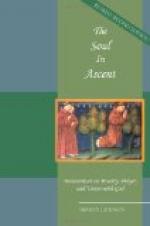What has made the average of human life so much longer than it was formerly? That very mysterious pestilence has turned attention toward its causes, and thus the race has been made cleaner, purer, more fit to endure. Why do men live in houses with scientific plumbing, fresh air, and have well-cooked food? Because that fierce teacher, pestilence, has taught them that any other course means weakness and death. Whom nature loveth she chasteneth is a truth as clearly written in human history as “Whom the Lord loveth He chasteneth” is written in the Bible. The true attitude toward the austere, for a philosophic as for a Christian mind, is one of complacency. Every severity is intended for benefit. By wars the enormity of war is made evident. By disease the necessity for observation of the laws of health is emphasized. Even death, in the order of things, at last is a blessing, for one generation must give place to another, or the evils that Malthus feared would be quickly reached. Moreover death, in its proper time, is only nature’s way of giving the soul its freedom. Hindrances in its path do not indicate the presence of an enemy but of a friend who discovers the only sure way of securing its finest development. The cultivation of the philosophic and Christian temper, which are practically the same, would make this a happier world. We could endure trials with more courage if we would but remember that they are as necessary to our growth as the cutting of a diamond is necessary to the revelation of the treasury of light which it holds.
The heights of character are slowly reached, and, usually, only by the ministry of the austere; but once they are reached the horizon expands, and the soul finds in the clearer light peace if not joy.
This course of reasoning does not make the mistake of regarding sin as less than dreadful. Every sin has hidden in its heart a blessing; but sin as such is never a blessing. It may be necessary for Providence to allow a spirit to sink again into animalism in order that it may be taught its danger, and made to realize that only through struggle can its goal be reached—but the animalism in itself is never beneficent.
When we say that the process by which a man rises may be justified, we do not mean that all his choices are justifiable. The process of his growth provides for his fall, if he will learn in no other way, but it does not necessitate his fall; that is ever because of his own choice. A spirit may choose to return to the slime from which it has emerged. That choice is sin, but it can never be made without the protests of conscience which will not be silenced, and it is by those protests that a man is impelled upward again, and never by the sin in itself. No one was ever helped by his sin, but millions, when they have sinned, have found that the misery was greater than the joy, and this perpetual connection of sin and suffering is the blessed fact. Sin is never




